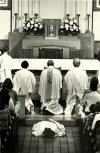Welcome
These reflections are a result of more than 40 years of ministry as a Roman Catholic priest. Most of these years I spent in the Diocese of Charlotte which covers Western North Carolina. Now I am retired, and live in Medellín, Colombia where I continue to serve as a priest in the Archdiocese of Medellín.
FRIDAY, WEEK XXXII, ORDINARY TIME—Saint Francis Xavier Cabrini, November 13
But now, I ask you,
not as though I were writing a new commandment
but the one we have had from the beginning:
let us love one another.
(2 Jn 1:5)
Sometimes it must seem like a broken record, but “let us love one another” has to be said over and over again. It’s the problem with Christian community as our professor in seminary once said. She said, “Christian community never fully arrives, you always have to build it . . . it’s a lot like that old Paul Simon song which says, ‘You know the nearer your destination/The more you're slip slidin' away.’” Today is the feast of Mother Cabrini, an Italian lady who immigrated to the United States, founded a religious community to care for immigrants, became a citizen, and is the first canonized saint from the United States.
Media
THURSDAY, WEEK XXXII, ORDINARY TIME—Saint Josaphat,bishop & martyr, November 12
Perhaps this is why Onesimus was away from you for a while,
that you might have him back forever,
no longer as a slave but more than a slave, a brother,
beloved especially to me, but even more so to you,
as a man and in the Lord.So if you regard me as a partner, welcome him as you would me.
And if he has done you any injustice
or owes you anything, charge it to me.
I, Paul, write this in my own hand: I will pay.
May I not tell you that you owe me your very self.
Yes, brother, may I profit from you in the Lord.
Refresh my heart in Christ.
(Plhm 15-20)
Poor Onesimus . . . being sent back to his master, Philemon, who had the power to execute his runaway slave. Of course, Saint Paul was pulling a few heart-strings and paved the way of return with golden words: “welcome him as you would me.” Today is the feast of Saint Josaphat, bishop and martyr of the Ukrainian Greek Catholic Church. His tomb is in Saint Peter's Basilica in Rome.
WEDNESDAY, WEEK XXXII, ORDINARY TIME—Saint Martin of Tours, November 11
One of lepers, realizing he had been healed,
returned, glorifying God in a loud voice;
and he fell at the feet of Jesus and thanked him.
He was a Samaritan.
Jesus said in reply,
“Ten were cleansed, were they not?
Where are the other nine?
Has none but this foreigner returned to give thanks to God?”
Then he said to him, “Stand up and go;
your faith has saved you.”
(Lk 17:15-19)
Jesus points out that although ten were cured, only one was saved, the one who came back to give thanks, and that one was a foreigner. Being thankful is essential to salvation. In the past, this day was known as Armistice Day, that celebrated the signing of the articles of peace that ended the First World War, at the eleventh hour of the eleventh day of the eleventh month. It is also the feast of Saint Martin of Tours—a soldier who is converted when he encounters a beggar and shares his cloak with him, and then gives up war to serve God. Saint Martin is the first officially canonized saint who was not a martyr.
TUESDAY, WEEK XXXII, ORDINARY TIME—Saint Leo the Great, pope & doctor, November 10
“Who among you would say to your servant
who has just come in from plowing or tending sheep in the field,
‘Come here immediately and take your place at table’?
Would he not rather say to him,
‘Prepare something for me to eat.
Put on your apron and wait on me while I eat and drink.
You may eat and drink when I am finished’?
Is he grateful to that servant because he did what was commanded?
So should it be with you.
When you have done all you have been commanded, say,
‘We are unprofitable servants;
we have done what we were obliged to do.’”
(Luke 17:7-10)
“Unprofitable servants” sounds a bit harsh . . . but Jesus is in our midst as “the one who serves” (Lk 22:27) and shows us all how to serve others. Today is the feast of Saint Leo the Great . . . the church is always very reserved about putting “the Great” on any saint. But Saint Leo qualifies as a “servant of the servants of God.” I was grateful to be ordained a priest in the parish of Saint Leo the Great in Winston-Salem, North Carolina.
FEAST OF THE DEDICATION OF THE LATERAN BASILICA IN ROME—November 9
Do you not know that you are the temple of God,
and that the Spirit of God dwells in you?
(1 Cor 3:16)
The liturgy invites us to celebrate the birthday of churches. Today is the anniversary of the dedication of the Lateran Basilica which is the cathedral church of the city of Rome. In the entrance to the basilica is carved: “Omnium Urbis et Orbis Ecclesiarum Mater et Caput” (Mother and Head of all the churches in the City and the World). But as Saint Paul gently reminds us, God does not dwell in a temple made by human hands, God dwells in us.
XXXII ORDINARY SUNDAY
We do not want you to be unaware, brothers and sisters,
about those who have fallen asleep,
so that you may not grieve like the rest, who have no hope.
For if we believe that Jesus died and rose,
so too will God, through Jesus,
bring with him those who have fallen asleep.
(1 Thes 4:13-14)
We are still within the Octave of the Faithful Departed (November 2-9), and we will continue to remember them throughout the month of November. This Sunday we have this wonderful reminder from Saint Paul about those who have fallen asleep in the Lord. As Christians we have called the places where we bury our dead, “cemeteries” literally “sleeping places,” where their bodies sleep until the Resurrection. Today's photo is of Magnolia Cemetery in Mobile, Alabama.
Wake up, sleeper,
rise from the dead,
and Christ will shine on you.
(Eph 5:14)
Johann Sebastian Bach used the Parable of the Virgins (Matthew 25:1-13) as the basis for his cantata, Wachet Auf (Sleepers Awake!), ca. 1731.
Media
SATURDAY, WEEK XXXI, ORDINARY TIME
You Philippians indeed know that at the beginning of the Gospel,
when I left Macedonia,
not a single church shared with me
in an account of giving and receiving, except you alone.
I am very well supplied because of what I received from you
through Epaphroditus,
“a fragrant aroma,” an acceptable sacrifice, pleasing to God.
My God will fully supply whatever you need,
in accord with his glorious riches in Christ Jesus.
(Phil 4:15,18-19)
How important this tiny community of Philippi is to Saint Paul’s ministry. And he is grateful. And we’re grateful that Saint Paul’s mother taught her son manners—because we now have this ancient “thank-you” letter in our Bible today! Today's photo is of a papyrus of Philippians 3-4.










